|
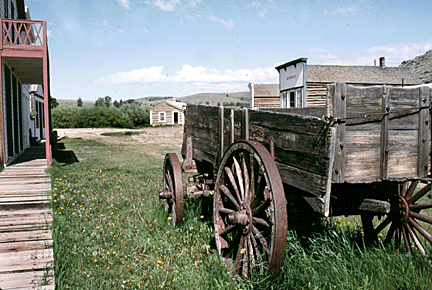 It's silent now in
South Pass
City. The only sound I hear is the eerie banging of a old rusty chain on the side of a
weathered buckboard as I stand in the middle of the town's earthen main street. Gone are
the rowdy miners, the painted-up dance hall girls, and the cavalry soldiers in town on
leave. The buildings that remain stand tall and proud. Each looks as if someone might come
through its doors on cue as if in a movie. Somehow I get the feeling that there's life
here. But isn't this a ghost town? It's silent now in
South Pass
City. The only sound I hear is the eerie banging of a old rusty chain on the side of a
weathered buckboard as I stand in the middle of the town's earthen main street. Gone are
the rowdy miners, the painted-up dance hall girls, and the cavalry soldiers in town on
leave. The buildings that remain stand tall and proud. Each looks as if someone might come
through its doors on cue as if in a movie. Somehow I get the feeling that there's life
here. But isn't this a ghost town?
Unlike many other western towns that have seen better days in the boom and bust cycle
of the search for gold, South Pass City, Wyoming,
lives on. Founded in 1867 during the closing last two years of the golden era of the
Oregon Trail, there was talk early on that it would rival Denver in its wealth, importance
and population. One of the most authentic large historic sites in the nation, it's 25 out
of the original 250 historic log, frame, and stone buildings live again thanks to loving
care and preservation. The town appears today much the way it did in the mid-1880s.
South Pass City was on the main north-south route to Yellowstone. The South Pass Hotel,
then known as the Idaho House, had a contract with the stage company. Its walls are just
two boards nailed together. Guests who stayed here anytime other than July would wake up
in the morning with ice on top of their blankets. But it sure beat sleeping in the
snow. As I peer into the rooms in these buildings, I see the real old West. Here,
the actual pieces of furniture, dishes, clothes, and tools that the townspeople used
remain in a perfect state of preservation. Definitely not a dilapidated ghost town, South
Pass City is more than realistic. It's reality.
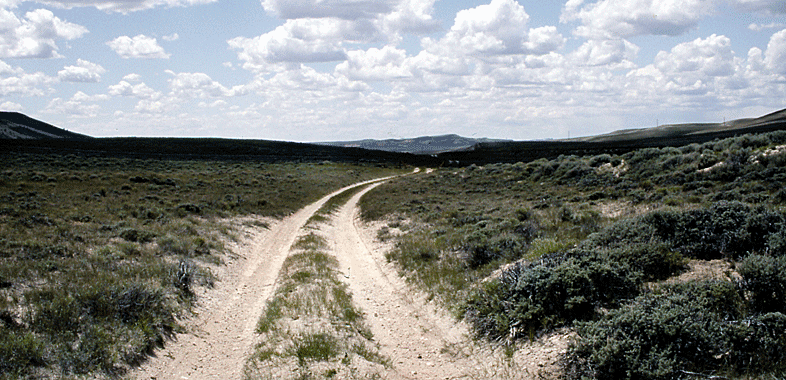
The first major excitement over gold in the Wyoming Territory occurred in 1867 near the
place where the Oregon Trail crosses the Rockies at South Pass. Thousands of miners and
businessmen stormed into the area seeking riches. Within weeks of the first strike,
prospectors descended on the area in much the same way as they had done in the gold fields
of the other western territories. They stayed only as long as the promise of easy wealth,
and when that fled, they followed. Twenty-five larger mines, with colorful names like King
Solomon's, Northern Light, Hoosier Bay, and Mohamet, and hundreds of smaller ones operated
at its peak.
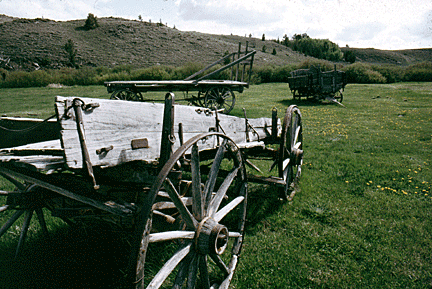 Nothing can compare to that first boom when thousands of miners suddenly rushed into
the area at the news of the rich Carissa Lode strike above South Pass City's future
location. The gold camp burst into existence within a few months. All the prospectors
necessities followed almost immediately. They included the usual proliferation of saloons,
hotels, breweries, general stores, brothels, and even a newspaper, the South Pass News,
and a bank. Such businesses appeared overnight because people with experience in previous
gold booms in California, Nevada, Colorado and Montana and elsewhere knew the easiest way
to make money in the gold fields was to sell supplies to the miners rather than chip into
solid rock or pan the frigid streams themselves. Nothing can compare to that first boom when thousands of miners suddenly rushed into
the area at the news of the rich Carissa Lode strike above South Pass City's future
location. The gold camp burst into existence within a few months. All the prospectors
necessities followed almost immediately. They included the usual proliferation of saloons,
hotels, breweries, general stores, brothels, and even a newspaper, the South Pass News,
and a bank. Such businesses appeared overnight because people with experience in previous
gold booms in California, Nevada, Colorado and Montana and elsewhere knew the easiest way
to make money in the gold fields was to sell supplies to the miners rather than chip into
solid rock or pan the frigid streams themselves.
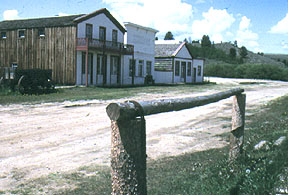 James Smith was just such a man. He built the first store, which later became the
longest running mercantile business in town. Emigrating from Ireland with his parents at
the age of nine, he eventually signed on with merchant ships and then joined the U.S. Navy
to fight in the Mexican War. He traveled to South Pass City in 1867 with others seeking
riches and staked out several choice business locations in town, as well as several gold
claims, thus beginning a long and successful career as an entrepreneur and speculator. James Smith was just such a man. He built the first store, which later became the
longest running mercantile business in town. Emigrating from Ireland with his parents at
the age of nine, he eventually signed on with merchant ships and then joined the U.S. Navy
to fight in the Mexican War. He traveled to South Pass City in 1867 with others seeking
riches and staked out several choice business locations in town, as well as several gold
claims, thus beginning a long and successful career as an entrepreneur and speculator.
Unfortunately, the strikes here turned out not to be as productive as was hoped and no
"Mother Lode" was ever found. "The community began to fade in 1872,"
he says. "However, a series of smaller booms occurred later on. Whenever the national
economy turned downward and the nation would go into a recession or depression, the
interest in gold mining would have a resurgence and people would move back into town and
reopen the old mines. They'd work them for a year or two and they'd go broke and their
kids would go hungry and they'd move away. When things got better in the rest of the
country, they'd try to find a real job somewhere."
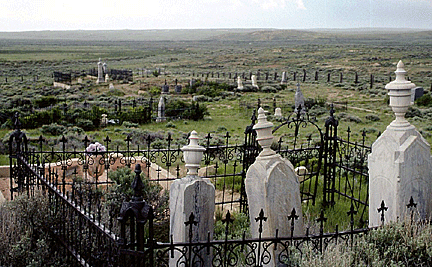 By the turn of the century, South Pass city's population hovered at almost 200. But by
1917 the interest in gold took a nosedive as strategic minerals and metals came into
prominence in preparing the nation for war. The final blow came with prohibition. Many
miners, unwilling to endure the hardships of mining without liquor, packed up and left.
Only the efforts of the Smith-Sherlock family kept the town from achieving ghost town
status through diversification with a general store, post office, hotel, restaurant,
livestock company and freighting business. By the turn of the century, South Pass city's population hovered at almost 200. But by
1917 the interest in gold took a nosedive as strategic minerals and metals came into
prominence in preparing the nation for war. The final blow came with prohibition. Many
miners, unwilling to endure the hardships of mining without liquor, packed up and left.
Only the efforts of the Smith-Sherlock family kept the town from achieving ghost town
status through diversification with a general store, post office, hotel, restaurant,
livestock company and freighting business.
One resident in particular, Janet Sherlock, a Scottish immigrant and the operator of the
South Pass Hotel, left a legacy for all to enjoy. Purchasing the Idaho House Hotel in 1873
and promptly renaming it the South Pass Hotel, she turned it into a business that
supported a large extended family for the next 80 years.
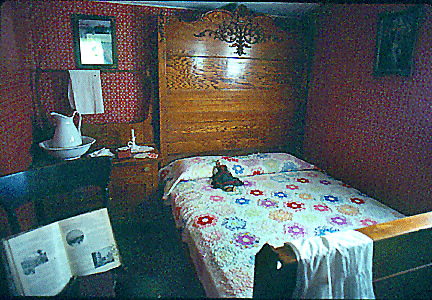 Soon after taking over the hotel, she married James Smith, the owner of the general store.
This began the dynasty of the Sherlock-Smith family which lasted until 1948. South Pass
City has always been a conservative town, even though some extraordinarily liberal things
happened here. The first successful women's suffrage bill in the nation, introduced by a
saloonkeeper and member of the Wyoming legislature, was subsequently passed. The woman who
spearheaded this bill, Esther Morris, became the first woman justice of the peace in the
world, and the first woman to hold political office in the country. Soon after taking over the hotel, she married James Smith, the owner of the general store.
This began the dynasty of the Sherlock-Smith family which lasted until 1948. South Pass
City has always been a conservative town, even though some extraordinarily liberal things
happened here. The first successful women's suffrage bill in the nation, introduced by a
saloonkeeper and member of the Wyoming legislature, was subsequently passed. The woman who
spearheaded this bill, Esther Morris, became the first woman justice of the peace in the
world, and the first woman to hold political office in the country.
Everyone knows that when something gets old, it usually wears out and is discarded. The
buildings and artifacts at South Pass City are old and worn, but they certainly haven't
been thrown away. Instead, they're being lovingly preserved for generations to come.
|
